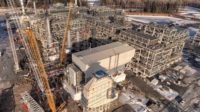With $11.6 billion in border wall contracts yet to be completed, contractors are working furiously to finish the 738 miles funded to date before an expected halt to construction promised by President-elect Joseph Biden.
The U.S. Army Corps of Engineers has not modified contracts to reflect the speed-up, says Raini Brunson, a spokeswoman for the U.S. Army Corps of Engineers. As of mid December, about 423 miles of wall construction was finished, which includes upgrades or replacement of about 353 miles of existing barriers, according to U.S. Customs and Border Protection (CBP) data.
Biden vowed to cut off wall construction, if elected, with more focus on high-tech aspects of border barrier security.
Stopping work on the first day of the new administration would save $2. 6 billion, according to a review of Corps data by The Washington Post.
But opponents living near ongoing or planned work seek immediate action.
They include officials in Zapata County, Texas, where no barrier currently exists, who passed a resolution Dec. 7 aimed at U.S. Dept. of Homeland Security Secretary-designate Alejandro Mayorkas. The resolution calls for a construction moratorium on Jan. 20 in the county, a review of project costs and contractor selection, and an end to waivers of dozens of environmental and procurement rules used to accelerate wall completion.
City officials in nearby Laredo, however, have so far declined to enact a similar ban, instead agreeing to a 30-ft-high barrier along most of its Rio Grande riverfront in exchange for a federally-funded promenade to be included in its design.
Meanwhlle, municipalities have lawsuits pending in federal court, which challenge U.S. efforts to obtain rights-of-way or seize private land needed for construction. About 70% of border land in Texas is privately owned. Still, the government continues legal actions to gain control of border parcels, says Ricardo De Anda, an attorney for local landowners.
The U.S. can cancel a wall construction contract at any time for convenience, but some officials worry that the high cost of termination could make it cheaper to continue some projects. De Anda says maintenance costs for existing wall upkeep, including repairs from damage by smugglers and floods, were “outrageous.”
CBP said current contracts would support new wall maintenance but did not comment on what costs would be.
The agency said work on 15 miles of new barrier in Starr County, Texas, in the Rio Grande valley would only begin once land is acquired. But CBP awarded construction contracts there before land was available, says the U.S. Government Accountability Office (GAO) in a Nov. 28 report to Congress. The agency says Corps officials noted project delays with land acquisitions proceeding before barrier designs and alignments were finalized.
Request to Biden
Thirty-five members of Congress asked Biden on Dec. 9 to rescind the national emergency declared by President Donald Trump that allowed him to divert billions of dollars from military construction and other programs to border wall work. They also seek dismissal of all land condemnation lawsuits and removal of overly broad Homeland Security Dept. waiver authority for barriers. “We find urgency in our desire to remedy the challenges our communities have faced over the last four years,” the letter said.
In an early December federal lawsuit, the Diamond A Ranch and Guadalupe Ranch Corp. in Arizona seek to stop agencies and Southwest Valley Constructors, a Kiewit Corp. unit, from further wall work, which plaintiffs claim has damaged property. The ranch abuts Roosevelt Reservation, a 60-ft border easement.
With $11.6 billion of contracts to complete, firms are pushing to finish 738 funded miles before President Trump leaves office.
Southwest Valley, which has a $419- million contract to build a 4.7-mile section of wall in steep, remote terrain, did not attempt to negotiate a right of entry but instead began operating heavy equipment on ranch property, “dropping large demolition debris,” the suit claims while leveling terrain using tons of explosives. “Clouds of demolition dust, shrapnel and car-sized boulders have come tumbling down,” it says.
Repeated ranch efforts to consult with the contractor to prevent or mitigate impacts failed to gain a “good faith response,” the complaint charges.
It also contends that wall construction could boost flooding of a nearby creek and wash away access roads. No hydrologic studies were provided to the ranch, despite professed support of CBP’s border mission, the suit said. The contractor would not comment and CBP did not respond. A federal. court on Dec. 7 denied an emergency work halt, however.
The El Paso County Water Improvement District in Texas appears to have restrained wall construction near its property it claims impeded operations by parking dump trucks in front of equipment used by contractor SLSCO, which had already trenched about 50 ft.
“Things were looking bad, but I hope we can get past January 20,” district General Manager Jesus Reyes told ENR. The Corps had plans to build the wall in the center of an operations and maintenance road along a 17-mile canal. The barrier would block access to the canal, which delivers water to 59,000 acres of farmland as well as to one of El Paso’s largest water treatment plants and the Tigua Indian tribe under a federal court order.
The canal also protects the city’s downtown from flooding.The wall “would completely cripple us,” he says.
Corps officials originally told Reyes of a Jan. 15 deadline to finish wall construction but assured him after a Dec. 9 meeting that the maintenance road route is “no longer a feasible option,” he says. The International Boundary and Water Commission also has opposed the barrier.
Biden's assurance he would ensure border protection is based on high-tech capacity to detect smuggling at ports of entry where observers say most drugs and illegal crossings occur. In an example of barrier failure to prevent smuggling, CBP said in a Dec. 9 announcement that use of drones to transport drugs across the border is on the rise.
And in yet another wall construction controversy on a project near San Diego, two whistleblowers—a former FBI agent and ex-deputy sheriff, each with a decade of experience—filed a false claim act complaint against SLSCO and its subcontractor Ultimate Concrete, saying they hired Mexican nationals, including some undocumented, as jobsite security guards.
The complaint, filed in February but kept sealed until earlier this month, also says the companies presented false claims for payment to the Corps. Neither the firms nor the agency would comment.








Post a comment to this article
Report Abusive Comment